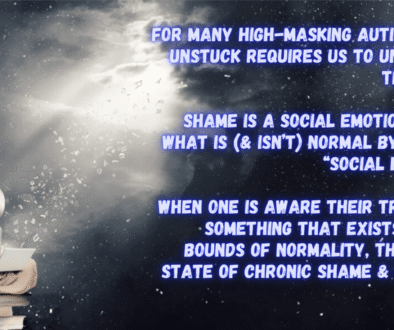Stuck in a Moment: How to Break Free
“Stuck in A Moment You Can’t get out of”
In “Stuck in a Moment you Can’t Get out of” U2, provides a vivid description of what it feels like to be stuck. Bono states this song was inspired by his friendship with Michael Hutchence, who died on November 27th 1997 at the age of 37 by suicide:
-
-
- It’s a row between mates. You’re kinda trying to wake them up out of an idea. it’s a row I didn’t have while he was alive. I feel the biggest respect I could pay to him was not to write some stupid sappy song, so I wrote a really tough, nasty little number, slapping him around the head, and I’m sorry but that’s how it came out of me
-
– Bono, (Werner, 2005)
 The lyrics of this song provide an attractive, description of what being stuck feels like. While digging through old files in my hallway closet, I found a research article titled “Stuck in a Moment” (Petriglieri, 2007). It turns out I had used it for a graduate paper & then journaled about it some later.
The lyrics of this song provide an attractive, description of what being stuck feels like. While digging through old files in my hallway closet, I found a research article titled “Stuck in a Moment” (Petriglieri, 2007). It turns out I had used it for a graduate paper & then journaled about it some later.
Ironically, it summarizes a state of “perpetual < that has plagued my life since early childhood. This stuckness< is a perplexing and terrifying frozen state. On the inside you are screaming for change or some sort of remedy. On the outside, you are much like the rabbit hiding in the field, frozen in place terrified & immobile. As an ongoing monkey wrench in my life, it has been an ongoing issue I’ve struggled to understand….
After coming to terms with the complex trauma & then more recently AUDHD, I have begun to really learned to “unstick myself”. There is a long story behind all this which I hope to delve into at a later time. Here, I feel it might be useful to provide a different perspective of stuckness that Petriglieri (2007) helps convey…
In his article “stuck in the Moment”, Petriglieri (2007) refers to the lyrics of this song (below) as providing a great description of how many people view a psychological impasse:
- You’ve got to get yourself together
You’ve got stuck in a moment
And you can’t get out of it
Don’t say that later will be betterNow you’re stuck in a moment
– U2: “Stuck in a Moment …”
 The stanza above begins with the following statement: “You’ve got to get yourself together”. This seems to imply the individual and their inherent brokenness is a root cause of the problem (Petriglieri, 2007). The stanza then continues as follows: “you’re stuck in a moment and you can’t get out of it”. This implies that you’re stuck in a moment of time as if in a form of emotional “suspended animation” & unable to do anything about (Petriglieri, 2007). It ends by reminding us that this is a bad thing and that nothing can fix it (Petriglieri, 2007).
The stanza above begins with the following statement: “You’ve got to get yourself together”. This seems to imply the individual and their inherent brokenness is a root cause of the problem (Petriglieri, 2007). The stanza then continues as follows: “you’re stuck in a moment and you can’t get out of it”. This implies that you’re stuck in a moment of time as if in a form of emotional “suspended animation” & unable to do anything about (Petriglieri, 2007). It ends by reminding us that this is a bad thing and that nothing can fix it (Petriglieri, 2007).
As a suicide attempt survivor this song reflects very much what “current me” might say to “past me”. It is my hope to save you from a self-hating beratement like this. The scholarly article which ultimately inspires this post, provides a useful perspective on “stuckness”. This will be the first in series of blog posts on the subject…
PausE & Listen to Some Great Music… 🙂
being stuck: a growth opportunity
Why being stuck really sucks: “White Knuckling it”
-
How do horrific experiences cause people to become hopelessly stuck in the past? What happens in people’s minds and brains that keeps them frozen, trapped in a place they desperately wish to escape?
– (Van Der Kolk, 2014)
The phrase “white knuckling it” refers to powering through a situation that is unbearable and excruciating. It describes very well the lived experience of those who feel stuck. The painful awareness of the situation at-hand tends to coincide with a desperate desire to forget it. Maybe if we ignore the situation, it will go away, right?
The most infuriating aspect of stuckness for me is when I know what I need to do but I simply can’t bring myself to take that next step. The idea of doing so brings about insurmountable fears. So I go through life pretending there is no problem. Until confronted with something that triggers a bad memory & my body registers the situation as threat (even when there is none). The body is keeping the score, and the memory of our trauma is alive within us (Van Der Kolk, 2014). Ignoring it accomplishes nothing…
Being stuck as a Developmental Opportunity
-
….traumatized people become stuck, stopped in their growth because they can’t integrate new experiences into their lives…..Being traumatized means continuing to organize your life as if the trauma were still going on—unchanged and immutable—as every new encounter or event is contaminated by the past.
– (Van Der Kolk, 2014)
In his research article “Stuck in a Moment”, Petriglieri, (2007) suggests we see “being stuck” as a developmental opportunity. Rather than “getting ourselves together” is there a different perspective that allows us to see clearly without the shame? Does stuck-ness have to be a bad thing? What about taking a step back and rethinking things? Below is a quick-and-dirty overview of transactional analysis to understand this unique perspective better.
An Overview of Transactional Analysis
 My old therapist used to keep nesting dolls on the coffee table in her office. We would utilize them in conversations from time to time. They were useful tools for reflecting on the underlying patterns in my relationships with others. During our discussions, she gradually introduced many interesting concepts & useful theoretical approaches to therapy. (This was before I decided to become a therapist). During our therapy sessions, Transactional Analysis was especially useful. It provided me a way of understanding of my inner world from an interpersonal context. While an in-depth review of this therapy approach is beyond the scope of this blog, there are a few key points to note:
My old therapist used to keep nesting dolls on the coffee table in her office. We would utilize them in conversations from time to time. They were useful tools for reflecting on the underlying patterns in my relationships with others. During our discussions, she gradually introduced many interesting concepts & useful theoretical approaches to therapy. (This was before I decided to become a therapist). During our therapy sessions, Transactional Analysis was especially useful. It provided me a way of understanding of my inner world from an interpersonal context. While an in-depth review of this therapy approach is beyond the scope of this blog, there are a few key points to note:
- Transactional analysis provides us a way of understanding our role in the dynamics of a social interaction. (ericberne.com)
- “The human brain acts in many ways like a camcorder, vividly recording” (ericberne.com) not only the events, but the emotions, sensations & thoughts associated with it.
- Personality can be thought of as multifaceted in nature. The human personality is comprised of a child, adult, & parent ego state. These states can exist in conflict with one another within us, (i.e. hurt child & critical parent).
- The concept of an “ego state” is useful in identifying patterns in the way we interact with others. They develop throughout our childhood and are “generalizations from personal experience” (Petriglieri, 2007).
- When we encounter something that triggers a memory of a past event this also causes a flood of emotions, thoughts and feelings. It is as if the camcorder is replaying the past events in the back of our mind. We are experiencing it emotionally in real time while trying to deny it.
- This can potentially confound a person’s ability to act thoughtfully. If a particular ego state is triggered, we behave in a way that is reflective of past events and not the current situation.
If you are interested in an in-depth review of transactional analysis, you can try checking out this link. If you are a visual learner you can watch these videos…
Putting the Pieces Together
According to Transactional Analysis being stuck reflects a “momentary inability or unwillingness to change.” (Petriglieri, 2007). This happens when we encounter situations that are beyond our ability to manage. A convenient example might be this blog which I have been unable to start for about 10 years. I’ve had many ideas & interesting posts. However I always fell short of going live.
What was the problem? (An overwhelming fear of exposing myself & opening up to others). As a former bullied child & an undiagnosed autistic, the opinions of others once left me terrified. I never understood why “they didn’t like me” & dealt with the situation by engaging in selective mutism through high school. Later, on I simply masked to the best of my ability and tried ignoring any inner anxiety. The idea of sharing myself with others in a blog became an impossible task. One that I never was able to completely let go of…
The solution came as I started to realize this impasse reflected a deeper issue. As I reflected on the insights with my old therapist during our time together, I recall her mentioning ADHD and possibly “something more”. In the back of my mind loomed a negative stigma regarding these diagnoses, so I dismissed the idea. She chose to not push further.
It wasn’t until I began to see the neurodivergent patterns within me that stuck-ness began to make sense. It has been useful in explaining how I handle certain situations. My “cognitive frameworks, emotional capacity, and behavioral repertoire (did) not allow (me) to make sense of, be within, and deal with…present intrapsychic or social realities.” (Petriglieri, 2007, p187). In other words, I’ve had some growing up to do…
How do you start Getting Unstuck?
The answer to this question will take time and much reflection for me. I have many posts in the works that can be useful in providing some answers. I will provide links below as I complete them. It is my hope that by sharing a little of my story (in an illustrative sense) that things might be clearer for you. Whether or not you are neurodivergent, I do feel the insights above are useful in beginning to develop a healthier perspective regarding a psychological impasse.
Yes you may be stuck in a situation you don’t like and maybe you feel it is your fault. I might recommend a less shame-based perspective that doesn’t place blame upon you but allows you to step back and reflect. Stepping back and accepting the situation as one which is only currently beyond your capacity to handle is a good place to start. This can allow you to begin doing the work of looking at those things that you had previously avoided. The truth ultimately sets us free doesn’t it?
References
Beaudoin, Marie-Nathalie. (2008). Therapeutic Movement and Stuckness in Family Therapy. Journal of Systemic Therapies. 27. 76-91. 10.1521/jsyt.2008.27.2.76.
Berne, E. (1996). Principles of transactional analysis. Indian Journal of Psychiatry. 38(3) 154.
Description of Transactional Analysis and Games by Dr. Eric Berne MD. (2013, January 28). Eric Berne M.D. https://ericberne.com/transactional-analysis/
Petriglieri, G. (2007). Stuck in a moment: A developmental perspective on impasses. Transactional Analysis Journal, 37 (3), 185-194
Solomon C. *(2003. Transactional analysis theory: The basics. Transactional analysis journal. 33(1), 15-22.
Van Der Kolk, B.A. (2014). The Body keeps the score: Brain, mind, and body in healing trauma. Viking. (Kindle Edition)
Werner, Jan. (2005) Bono: The Rolling Stone Interview: Rolling Stone. 98, 48-67 & 102-103


